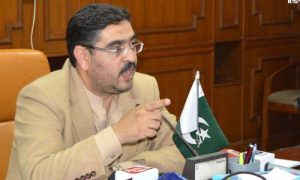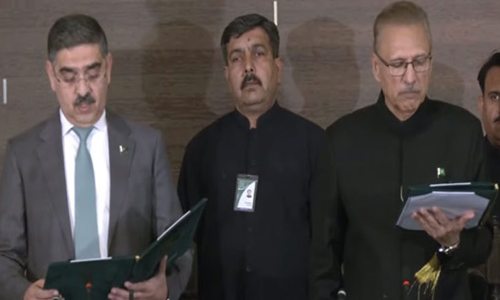ISLAMABAD: Anwaar-ul-Haq Kakar, a former senator and prominent leader of the Balochistan Awami Party (BAP), officially assumed office as the eighth caretaker prime minister of Pakistan on Monday. His role is crucial as he is tasked with guiding the nation through a period of uncertainty leading up to the impending elections.
President Arif Alvi administered the oath to Kakar in a solemn ceremony held at the Aiwan-e-Sadar. Distinguished attendees included former Prime Minister Shehbaz Sharif and former cabinet members.
The oath-taking event saw the presence of high-ranking officials, including Chief of Army Staff General Asim Munir, Chairman Joint Chiefs of Staff Committee General Sahir Shamshad Mirza, and Senate Chairman Sadiq Sanjrani.
In a national address delivered on Sunday, outgoing Premier Shehbaz Sharif expressed confidence in the caretaker prime minister’s capabilities to oversee the upcoming elections in a just and transparent manner.
Both factions of the political spectrum, representing the previous government and the opposition, welcomed Kakar’s appointment, expressing optimism that the interim prime minister would uphold the principles of free and equitable elections.
Kakar’s immediate focus, amid the backdrop of months of political and economic turmoil, is to assemble a proficient cabinet to govern the country during the extended election phase.
As per constitutional mandates, the dissolution of the parliament took place last week, prompting the announcement of elections to be held within the next 90 days.
However, the publication of recent census data earlier this month necessitated the election commission to recalibrate constituency boundaries, leading to expectations of a potential election postponement.
Persistent speculation about election delays has been fueled by the nation’s efforts to address a complex interplay of security challenges, economic woes, and political uncertainties.
Pakistan has remained in a state of political unrest since the dismissal of Pakistan Tehreek-e-Insaf (PTI) Chairman Imran Khan through a vote of no confidence in April 2022. The culmination of events led to Khan’s recent imprisonment for a three-year term on corruption charges, rendering him ineligible for electoral candidacy for the subsequent five years. Khan, however, is currently appealing the verdict in an effort to overturn his conviction.
Who is Anwaarul Haq Kakar, the Eighth Caretaker Prime Minister of Pakistan?

Anwaarul Haq Kakar, a prominent figure hailing from Qilla Saifullah, has taken on the mantle of the Balochistan Awami Party’s (BAP) interim leadership. Renowned for his political acumen, Kakar was instrumental in the inception of the BAP and now assumes the role of the second Balochistan representative to lead the interim administration, succeeding Mir Hazar Khoso, who held the position in 2013.
Kakar’s elevation to this key role is notable due to its timing, with less than a year remaining in his six-year tenure in the Senate, which is set to conclude in March 2024.
While Kakar’s family background isn’t entrenched in traditional politics, certain relatives had actively participated in political circles in the past. In 2008, he entered the electoral scene as a candidate under the PML-Q banner, vying for the NA-272 constituency. Despite his efforts, he was defeated by PPP candidate Nasir Ali Shah. Subsequently, he aligned with the PML-N and notably served as the spokesperson for then-Chief Minister Sanaullah Zehri for a span of nearly three years.
In 2018, Kakar played a pivotal role in orchestrating a no-confidence motion against Zehri, compelling the PML-N chief minister to relinquish his position, which paved the way for Abdul Qudus Bizenjo’s ascendancy.
The same year saw Kakar’s rise to the Senate as an independent candidate. Shortly thereafter, he established the BAP in collaboration with Syed Saeed Ahmed Hashmi. The alliance’s rapid formation drew both criticism and skepticism from the PML-N as well as Baloch and Pashtun nationalist parties, who labeled it a strategic maneuver by influential provincial figures with alleged backing from the establishment.
As the chief spokesperson for the party, BAP clinched governance in Balochistan subsequent to the 2018 elections. In the Senate, Kakar occupied a prominent role as the parliamentary leader for over four years, representing the BAP’s interests. However, a party reshuffle earlier this year led to him relinquishing this role.
Kakar’s significant contributions within the Senate extended to his participation in key standing committees, such as finance and revenue, foreign affairs, and science and technology. Additionally, he assumed the chairmanship of the Senate Standing Committee for Overseas Pakistanis and Human Resources.
Born into a middle-class Pashtun family on May 15, 1971, in Qila Saifullah — a district bordering Afghanistan — Kakar’s linguistic versatility encompasses English, Persian, Balochi, Brahvi, Urdu, and his native Pashto.
Kakar’s educational journey commenced at a private school in Quetta, subsequently leading him to Cadet College Kohat for his intermediate studies. Afterward, he returned to Quetta, where he graduated from the University of Balochistan before obtaining a Master’s degree in Sociology and Political Science.
His pursuit of a law degree led him to the UK, yet he opted to return without its completion, subsequently embarking on a consequential political trajectory in his homeland.
(Islamabad51-Newsdesk)














